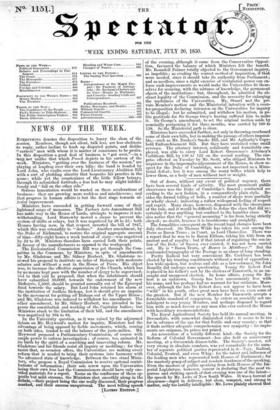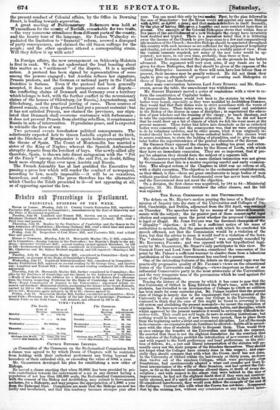Out of doors, without any event of political urgency, there
have been several kinds of activity. The most prominent public observance was the Duke of Cambridge's funeral ; conducted ao- cording to the new fashion in a comparatively plain style. Be- sides the formal tolling of bells, a number of shops were partially or wholly closed ; indicating a rather widespread feeling of respect and regret. Many shops, however, dispensed with-the observance of the rule, and it would be difficult to define the class that did So : certainly it was anything but confined to the humbler class. We also notice that the "general mourning " is far from being strictly obeyed ; no doubt, because it is troublesome and unsightly. The formalities consequent on the recent legal changes have been duly observed. Sir Thomas Wilde has taken his seat among the Peers as Baron Truro ; in Court, as Lord Chancellor. There was a report that he was to be Baron Eltham, taking his title from an ancient seat of royalty : but if that intent of legalizing the son-in- law of the Duke of Sussex ever existed, it has not been carried out. He is "Baron Truro, of Bowes in Middlesex !" But the confounded topographyof the Peerage is an abuse of long standing. Radical cal but very convenient Mr. Cockburn has been elected by his trusting constituents without a word of opposition • less wide-spoken, but zealous and able as a law-reformer, Sir Mai Romilly did undergo some questioning. Young Sir Robert Peel is placed in his father's scat by the electors of Tamworth, in an un- sought and unopposed election. In home affairs, young Sir Ro- bert is an unknown. Gossip has been uncommonly free with his name, and has perhaps had no warrant for her criticism. More- over, although the late Sir Robert does not appear to have been " wiid " in his youth, other great men have been so, even some of the greatest. But if the new Member for Tamworth accepts a formidable standard of comparison, he enters an assembly not an- indulgent to any young Member, and perhaps disposed to regard him with as much favour as any man who ever entered the House with hereditary recommendations. The Royal Agricultural Society has held its annual meeting, in Devonshire, with somewhat diminished éclat : it seems to be too far in advance of the age for that fertile and easy county ; so that it finds neither adequate comprehension nor sympathy : its imple- ments are enigmas, its prizes not prized. An association of a totally different kind—the Society for the Reform of Colonial Government—has also held an anniversary meeting, at a Greenwich dinner-table. The Society's muster, not very strong in absolute numbers, was yet remarkable for the num- ber of separate political parties represented in it—Tory, Radical, Colonial, Neutral, and even Whig ; for the talent and influence of the leading men who represented both Houses of Parliament ; for the masterly grasp of subject and resolute frankness of the speaking. Even the masters of public speaking from both Houses of the Im- perial Legislature, however, concur in declaring that the most vi- gorous and striking speech of that evening was one of the latest— the speech by Mr. Lowe of New South Wales. It was a torrent of eloquence—rapid in delivery, but clear, compact, and strong in matter, only too lucidly intelligible : Mr. Lowe plainly showed that
the present conduct of Colonial affairs, by the Office in Downing Street, is leading towards separation.
A great meeting of Parliamentary Reformers was held. at Wymondham for the county of Norfak, remarkable for two traits, —the very numerous attendance from different parts of the county, and the hearty tone of the language. Sir Joshua Walmsley re- pudiated the limitation to "financial" reform, avowed a disregard of party consequences, and claimed the old Saxon suffrage for the irgedie7fdollthowe itti.thuperwsiria !et:s? uttered a corresponding strain.



























 Previous page
Previous page